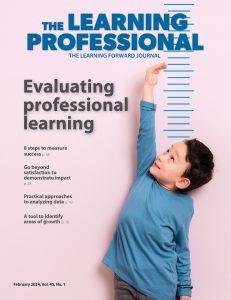On July 21, Learning Forward led a conversation on Twitter about coaching. It was focused on the articles in the most recent issue of The Learning Professional. Educators gathered virtually to talk about building resilience, maintaining relationships, managing the unexpected in the new school year, and more.
In case you missed the Twitter chat, below are the five questions that we asked participants:
- Our polls show 98% of educators say coaching roles are different when supporting teachers online rather than in person. How are your coaching roles different for ‘20-‘21 school year?
- Sharron Helmke writes that it is essential to focus on building staff resilience right now. How are you fostering resilience?
- It’s so important to stay connected to staff & students during these times. A tool from Turnaround for Children offers one way to track your outreach. What other strategies are you using to make sure you stay connected with staff?
- The current crisis is opening up new opportunities for leadership and inspiring new people to lead, according to Ellie Drago-Severson and Mary Anton. How can you encourage leadership in your coaching?
- The only thing that’s certain about the next school year is there will be a lot of uncertainty. How are you supporting staff and colleagues to cope with that uncertainty?
Discussion about the questions above led to shared insights, strategies, and tools in preparation for the new school year. Below are some takeaways from the Twitter chat:
- Most of the participants are feeling hopeful about the upcoming school year, but also concerned.
- Some challenges that participants foresee with virtual coaching this school year include building new relationships and developing trust. However, participants also see opportunities with virtual coaching this school year that include easier and faster access to coaches and teachers, innovative thinking, and more technical support for teachers.
- Coaches plan to foster resilience this year by providing professional development in multiple forms (online courses, books, webinars) that are focused on teachers’ well-being. Coaches also plan to help foster resilience by checking in with teachers, encouraging discussion of emotions, deeply listening, and celebrating growth from challenges and learning from mistakes.
- Participants have used Google sheets to track time spent with teachers, some have checkpoints in their calendars to stay connected with teachers, and others plan to use coaching tools from slido and KickUp. Joellen Killion advised participants to be sure to track the four Ts: teacher, time, topic, and task.
- Examples of ways coaches can encourage leadership include giving teachers a platform where they share strategies and resources with colleagues, offering co-facilitation with virtual learning meetings/events/sessions, and offering microcredential opportunities.
- Coaches can help colleagues and staff cope with the uncertainties of this upcoming school year by being transparent, making themselves available to talk, listening to concerns and fears, protecting time for reflection, reminding teachers and staff that they are not alone, and maintaining a positive and hopeful disposition.
You can view the archived version of the full chat here or view all of the tweets from the chat, including participants’ virtual coaching recommendations, below. To be notified of future Twitter chats, follow us on Twitter @LearningForward. Thank you to all participants for contributing to this conversation.








